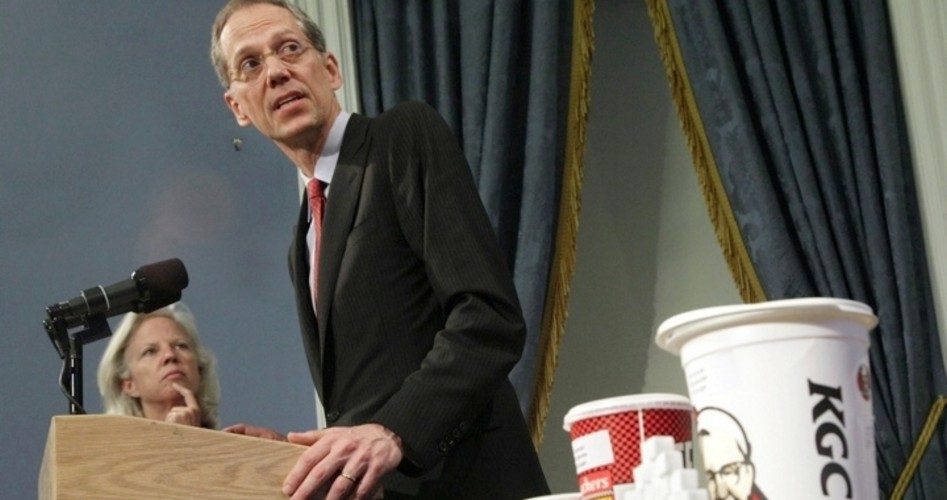
On Thursday, the city of New York became the first to ban super-sized sugary drinks in restaurants, a move that analysts contend will set the stage for a legal challenge by the beverage industry. Opponents of the ban contend it violates consumers’ rights to drink what they want to drink, regardless of the touted intent behind the law to improve consumer health.
The ban was approved by the Board of Health and now limits drinks sold in restaurants and delis to no larger than 16 ounces. The ban is set to take effect in six months and will impose a $200 fine on all businesses that do not comply with the ban.
The ban passed rather easily in the Board of Health, which is appointed by Mayor Michael Bloomberg, who proposed the ban in May. Eight Board of Health members voted yes, with none opposed to it. Just one board member, Dr. Sixto R. Caro, abstained after saying he remained ‘skeptical’ about how much good the rule would do to reduce obesity.
Fifty-eight percent of New Yorkers are either obese or overweight according to city data, and 40 percent of the city’s school children are obese or overweight. Supporters of the ban are blaming sugary drinks and sodas for the obesity problem, as Americans consume an average of 40 gallons of soda per person every year.
“It’s time to face the facts: Obesity is one of America’s most deadly problems, and sugary beverages are a leading cause of it,” Bloomberg said last week, after announcing that Weight Watchers had thrown its support behind the soda rule.
The ban will not be affecting grocery stores, which are controlled by the state.
The rule has received a variety of responses. The Los Angeles Times reports:
Depending on the point of view, the rule is a violation of basic human rights; a measure to protect children from lives of diabetes, heart disease and other ills; an economic misstep; or a necessary move toward curbing New York’s obesity problem. But the law, which Bloomberg proposed last May, also led to a broader debate of how best to control the city’s — and the nation’s — collective weight problem.
In the public comments period that preceded the vote, critics articulated a variety of criticisms against the city. Some said the rule would only serve to further New York’s reputation as a “nanny state.” Others argued that the city has failed to pursue more effective obesity-combatting measures, such as spending money on after-school recreation programs or parts to exercise in areas most affected by diabetes and other weight-related issues.
Opponents of the ban include Eliot Hoff, spokesman for New Yorkers for Beverage Choices, a group of individuals and businesses who are opposed to the regulations. Hoff contends that this issue, like many others, is not about health but about freedom. He states, “The people of New York can make their own decisions about what they eat or drink.”
“More choice rather than less choice is the way to go,” Hoff believes.
In an interview with The New American, Danny Panzella of Liberty HQ — a grassroots libertarian activist organization that led a march on City Hall against the ban — called the rule yet another example of New York’s “crippling regulations.”
“This is Bloomberg regulating business and personal behavior. He is creating a fiat-bureaucratic system where there is no accountability to voters,” Panzella told TNA. “He’s taking away property rights of business owners and limiting choices for consumers.”
According to Panzella, Bloomberg is guilty of “social engineering,” and Bloomberg’s affront to the rights of consumers will not stop here.
“They’re already talking about limiting the size of popcorn at the movie theaters. First it was salts and trans fats, now it’s soda. What will be next?” Panzella asked.
Over the course of the last few years, New York City has passed several health-related changes. In 2008, for example, New York issued a rule requiring restaurants to include calorie counts on their menus.
New York City issued a rule in 2006 that forced restaurants to cut the use of trans fats in prepared food.
In 2011, the city banned smoking in most public areas, including beaches and parks.
Mayor Bloomberg has acquired something of a reputation for his focus on obesity and the health habits of New York residents. He has attempted to replace high traffic areas such as Times Square with pedestrian plazas, and has replaced a number of parking spots with bicycle lanes.
But as noted by The New American earlier this year, despite Bloomberg’s anti-obesity rhetoric, he is a hypocrite. TNA’s Michael Tennant writes:
New York Mayor Michael Bloomberg [is] trying to ban super-sized sodas on the theory that doing so will curb obesity, [but] gives away free soda in unlimited quantities to employees of his media conglomerate, Bloomberg L.P.
“We have all the junk in the world up there,” a Bloomberg employee told the New York Times in 2010. “I mean, you can gain 15 pounds in a hurry.”
In other words, do as I say, and not as I do.
Meanwhile, some New York residents believe that the mayor’s attention should be elsewhere, particularly since major crimes are up 4.2 percent in 2012.
According to the New York Post, this is the first time in 18 years that all eight NYPD “patrol boroughs” have seen an increase. Those crimes include grand larceny, sex crimes, and shootings, all of which have dramatically increased since 2011.
Bloomberg and NYPD Commissioner Ray Kelley have boasted that murder rates in New York have dropped 15.6 percent, but as one New York Post source notes, shootings have increased, as well as “shooting incidents.” Fortunately, fewer people have died as a result.
“People are still getting shot — but they’re not dying as much,” said the source. “Modern technology.”
One New York City resident, Thomas Nash of Brooklyn, bemoans what he calls Mayor Bloomberg’s “misguided sense of priorities.”
“One would think that with major crimes in New York on the rise, our mayor would focus his attention on that and not on the dietary habits of New Yorkers,” said Nash. “I don’t know about other New York City residents, but I for one know that I am perfectly capable of making decisions regarding my own health.”
Analysts contend that the rule will likely provoke lawsuits once businesses notice an impact on their business as a direct result of the ban.
Photo: New York City Health Commissioner Thomas Farley, accompanied by Deputy Mayor for Health and Human Services Linda Gibbs, at a news conference at New York’s City Hall, May 31, 2012: AP Images




